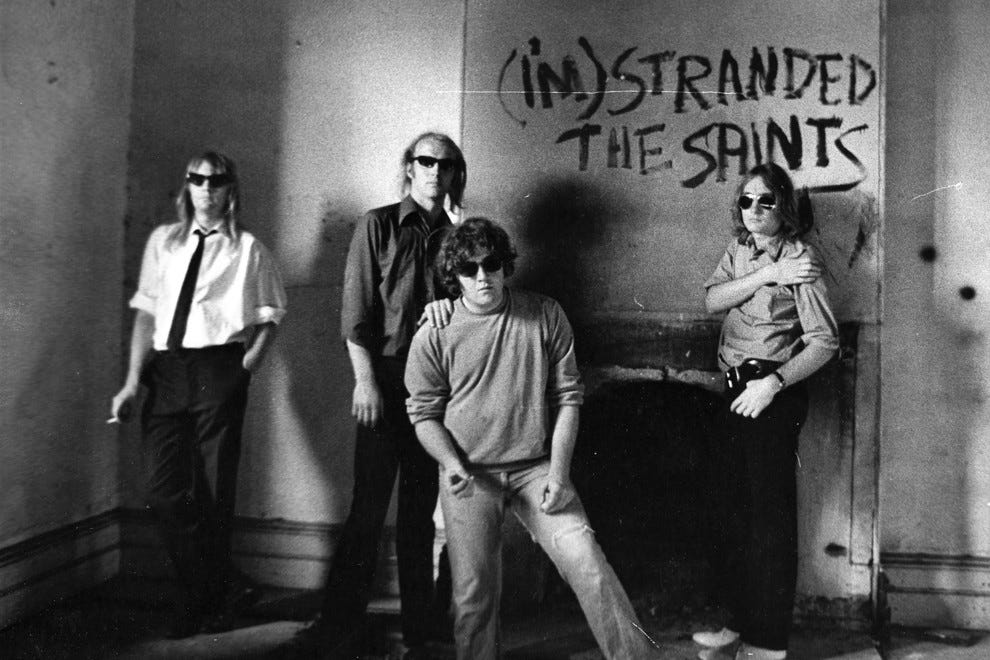The Saints | History of the Band
Too Raw for Rock, Too Smart for Punk—How an Australian Band Rewrote the Playbook
If we don't dig out these bands, who will? Get 30% off a today and help us uncover the records that history forgot.
Brisbane’s mid-'70s music scene leaned heavily toward pub rock, making it an unlikely birthplace for a punk band. Yet, The Saints defied expectations with their raw energy and refusal to conform.
Chris Bailey (vocals), Ed Kuepper (guitar), and Ivor Hay (drums) weren’t interested in fitting in. They were drawn to the raw energy of The Stooges, MC5, and ‘60s R&B. In 1973, they formed a band—before punk was even a term. By 1974, they had a name, an attitude, and a sound too loud and too fast for Brisbane’s conservative venues.
No punk scene. No labels interested. No radio play.
They took matters into their own hands, self-financing and releasing “(I’m) Stranded” in 1976. The UK press took notice immediately. Sounds magazine called it “the single of this and every week,” igniting international interest overnight.
Musical Style and Evolution
The Saints didn’t just play punk; they embodied it. Their early sound was breakneck, distorted, and confrontational.
Unlike The Ramones or The Sex Pistols, The Saints had a bluesy undercurrent. Kuepper’s jagged yet soulful guitar and Bailey’s sneering vocals carried a melodic weight that set them apart.
By their second album, they were adding horns. By their third, they had evolved into post-punk. Some fans struggled with the shift, but The Saints weren’t interested in staying static. Their evolution was relentless.
This artist was suggested for a future Dig Me Out podcast episode. Each month, our Patrons are presented with a selection of albums suggested by listeners and asked to vote for their favorite.
Discography and Notable 70s Albums
I’m Stranded (1977)
Label: EMI
Producer: Rod Coe
Recording Studio: Window Studios, Brisbane
The Saints didn’t wait for a label. They recorded I’m Stranded in their hometown, capturing their live energy. The title track became an underground anthem, while “Erotic Neurotic” and “No Time” showcased their furious intensity.
Despite UK praise, EMI barely promoted it in Australia. The band’s strained relationship with their label limited their mainstream reach, pushing them toward an increasingly independent path. Frustrated with industry indifference, they experimented further rather than chasing commercial trends.
Eternally Yours (1978)
Label: Harvest
Producers: Ed Kuepper, Chris Bailey
Recording Studio: Roundhouse Studios, London
The Saints took a bold step forward, adding brass and a richer production style. Their evolving sound blurred the lines, bridging punk, post-punk, and R&B. Songs like “Know Your Product” introduced a punk-soul fusion years before The Clash attempted similar sounds. “Private Affair” and “This Perfect Day” reflected Kuepper’s increasingly refined songwriting.
Prehistoric Sounds (1978)
Label: Harvest
Producer: Ed Kuepper
Recording Studio: Wessex Studios, London
By their third album, The Saints had outgrown punk entirely.
Not everyone understood what they were doing. Some listeners struggled with the shift, while others embraced it as a bold artistic leap. Critics were similarly divided—NME praised the album’s depth, while punk purists dismissed it as a departure. Over time, Prehistoric Sounds gained a cult following, recognized as a visionary step toward post-punk.
The Saints had critical acclaim but little commercial success.
In the UK, Melody Maker and NME hailed them as innovators. But they weren’t media darlings like The Clash or The Sex Pistols. Their refusal to conform—musically or aesthetically—meant they never fit neatly into the punk narrative.
Later retrospectives, however, have been kinder. Prehistoric Sounds is now considered a lost classic. Eternally Yoursmade 100 Best Australian Albums, cementing its status as an essential listen.
Influence and Legacy
They weren’t stadium-fillers. They didn’t have radio hits. But The Saints influenced generations of musicians.
Nick Cave credited them as an influence, particularly in his early work with The Birthday Party, where their raw, uncompromising energy is evident. The Go-Betweens admired their fiercely independent ethos, shaping their own approach to songwriting and recording. Even The Pogues drew from The Saints’ punk-meets-soul experimentations. Their willingness to evolve beyond punk paved the way for countless post-punk and alternative bands who rejected formulaic structures in favor of artistic freedom.
After Kuepper left in 1979, Bailey carried on with The Saints, steering them into new wave and alternative rock. Meanwhile, Kuepper’s solo career earned him acclaim in Australia’s indie circles.
The Saints’ 1970s output was fearless. From the raw punk blast of I’m Stranded to the sophisticated, genre-defying Prehistoric Sounds, they were always pushing forward.
Were they the biggest band of their era? No.
But were they one of the most forward-thinking? Absolutely. Today, their legacy is cemented in punk and alternative circles as a band that not only pioneered a raw, independent spirit but also laid the groundwork for future post-punk and indie artists who refused to conform.
If we don't dig out these bands, who will? Get 30% off a today and help us uncover the records that history forgot.



